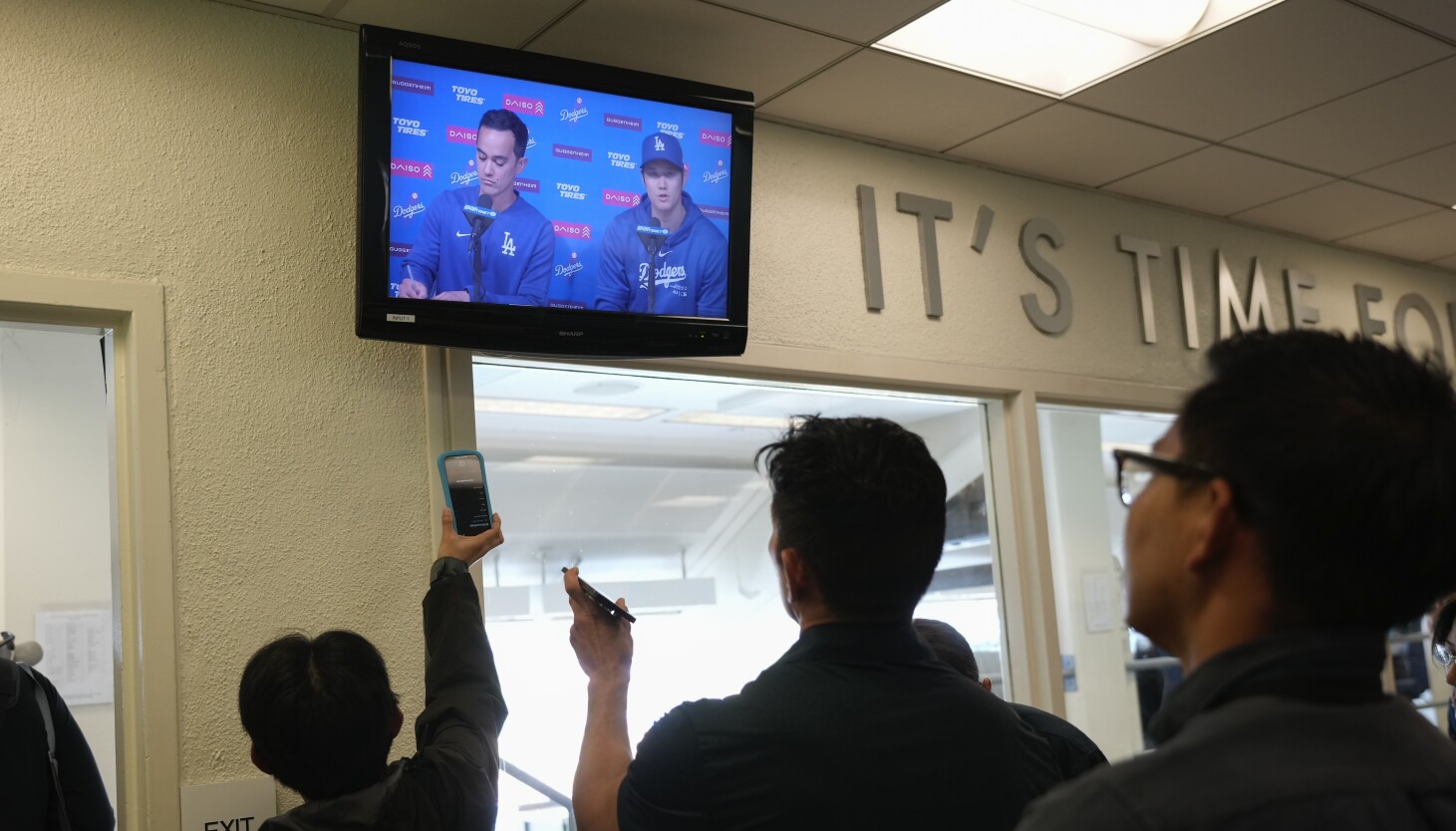
LAS VEGAS — In Tokyo, Bob Whiting couldn’t help but witness the Shohei soliloquy Monday. It was all over the world’s largest newspaper, Yomiuri Shimbun, and NHK, the country’s leading TV channel.
The only recent pock against the baseball superstar had been going 0-for-3 in an exhibition game, a mortal stat line that still placed Shohei Ohtani top-of-the-fold on the front page.
However, the betting shenanigans of ex-interpreter and longtime pal Ippei Mizuhara have dominated the Ohtani news feed for the last 11 days.
“Big news here, Topic No. 1 on afternoon talk shows, the lead on evening TV sports news,” Whiting wrote me in a series of emails. “People are dismayed about it. Everything Ohtani does is heralded.”
Of Japan’s top 10 TV shows in all categories in 2023, seven were World Baseball Classic games.
“Everyone wants Ohtani to succeed, to be better than Babe Ruth,” Whiting wrote. “It’s a matter of national pride.”
Ohtani’s 650-word speech Monday hardly qualified as a news conference, since those usually entail back-and-forth questions and answers with media figures.
A new interpreter — “hopefully one who doesn’t have a gambling problem,” Ben Maller said on his Fox Sports overnight radio show — seemed to clearly translate Ohtani’s words.
Ohtani appeared authentic when he implored that he has never bet on baseball, or any other sports, nor asked anyone to do so on his behalf via a bookmaker. And he reiterated that he never bet on sports or willfully sent money to a bookmaker.
“OK, as far as it went and Ohtani looking like he was truthful,” Whiting wrote about his observations, “but there were some unanswered questions.”
Strike one
A gifted author who has been nominated for a Pulitzer Prize, Whiting is an expert source to describe the Shohei Ohtani scene in Tokyo and what the pitcher/slugger means to Japan.
At 19, Whiting was assigned to Fuchu Air Station by the U.S. Air Force in 1962, and he has rarely left, falling in love with the Land of the Rising Sun, adopting it as home.
I had read his 1999 “Tokyo Underworld,” a deep unveiling of the notorious yakuza that produced threats, long before forging an email friendship with him. The book hit No. 1 in Japan.
Whiting, 81, also composed the best-selling “You Gotta Have Wa,” on Japanese baseball, and “The Samurai Way of Baseball.” His 2021 memoir “Tokyo Junkie” is superb. His newspaper and magazine articles are many.
We became email pals after I complimented him about Junkie. I’ve tried to encourage him to produce the definitive tome on Ohtani-san. To me, only the Japanese-fluent Whiting is properly equipped to do that life story justice.
However, projects fill his calendar. I hold out hope that Ohtani slips into Whiting’s crosshairs. In the meantime, the Ohtani-Mizuhara drama has only just begun.
Tangled Ohtani web
The Japanese have a “split personality,” according to Whiting, regarding gambling. State-sanctioned sports like motorboat and horse racing are popular.
“As well as pachinko [pinball],” he wrote. “You can win prizes, such as cigarettes or canned fruit, then walk around the corner, down an alley, and exchange your winnings for cash from some gangster.”
Betting on baseball, though, is verboten. In 1970, Whiting has detailed, the “Black Mist” game-fixing scandal “almost destroyed the game.” Yakuza paid ¥500,000 apiece to a catcher, infielder and outfielder, ¥1 million to pitchers.
“But underground sports betting, run by yakuza, goes on and is quite widespread,” he wrote. “It’s easy enough to find a bookie. There are also underground casinos that are routinely busted by police.”
The potential for Macao-type casinos in Japan is a current controversy.
Whiting relayed that Ohtani always reminded him of Robert Redford’s character in “The Natural”:
“Pure. Pristine. Always happy. In love with the sport of baseball. Unreal, seemingly magical powers as an athlete. Then his life is ruined by The Lady in Black. Will this scandal be the equivalent of The Lady in Black?”
In addition, Ohtani trying to maintain ultra-privacy as such a globally public figure is quite the contradiction.
“In that way, it’s easier to raise suspicions about him,” Whiting wrote. “Maybe if he had showed some video of his wife kicking his ass on the basketball court, in one-on-one, people could relate to him a little better. As it is, he’s too much of a blank slate.”
Whiting also knows an interpreter’s gig is a unique challenge. He cites the half-hour shifts pulled by simultaneous interpreters at the United Nations as evidence.
“The effort and concentration required is so intense and stressful,” he wrote me. “So Mizuhara might be forgiven for attempting to relieve some stress by engaging in underground gambling. And sympathy might be appropriate for his wife.”
Whiting wonders how Mizuhara extracted so much money, wired to illegal Southern California bookie Mathew Bowyer, from Ohtani’s account without the player’s knowledge?
Did Mizuhara have power of attorney, or did he steal Ohtani’s password for a digital transfer? How did the original story about “helping out a friend” come to pass?
“With no Q&A, it was a swing and a miss,” Whiting wrote of Monday, “or maybe just a foul ball.”
Heard around the world.